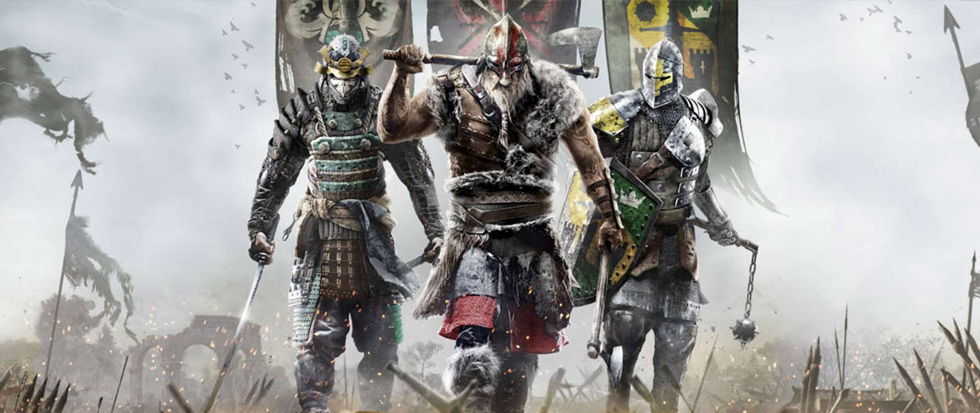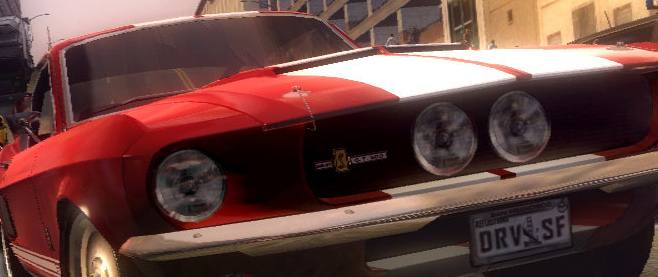
For Honor Gives Me the Rush of Fighting Games
Here’s a rare glimpse into my mysterious life: I’ve always wished that I was great at Street Fighter and fighting games. When I was a kid with only a couple of quarters to spare, I would spend many afternoons at the arcade and deposit these coins into Street Fighter machines, hoping for a shot for superstardom. But I was hideously bad at fighting games, and often got my ass handed to me by more seasoned players in a snap. So instead of pointlessly draining my wallet of money, I spent the bulk of my time watching far more spectacular matches between veterans. There’s nothing quite as stimulating as watching two gladiators choreograph their moves and attacks on the fly, as they attempt to outsmart and outlast each other in a fight to the death. Or at least until they exhaust their stack of tokens.
Most videogame players would know that the genre is more than just twisting about an arcade stick and button mashing the controls to bits; it’s a highly demanding sport with a notoriously steep learning curve. To become even moderately competent means investing hours of leisure time into picking up the basics, but back then, my adolescent impatience just doesn’t grant me that sort of tenacity. I hated going through the motions of learning how to play. And it didn’t help that trying to punch in specific combos in the right order and at the right time, while guessing your opponents’ every move, probably requires a higher level of cognitive skills; they involve a keen understanding of human psychology, and the dexterity to read complicated situations and react within a fraction of a second. It’s exhausting. It can be exhilarating. Yet, it’s also a whole lot of learning for most videogame players to take in.
Without the means and motivation to play competitively, I’ve relegated myself to merely watching these sparring matches from the sidelines. That is, observing but not participating in multi-player and online sparring sessions, and being stuck in single player modes with AIs that range from being so forgiving that they had shed all pretense of combat, to painfully punishing ones that were probably programmed by a developer who hated beginners.
But Ubisoft’s hack-and-slash title, For Honor, has resuscitated my love for fighting games. It has helped me become less irritable and impatient about learning to play. It makes me want to devote hours just to hone my skills—because it’s so darn engaging.

The key to its accessibility lies in how For Honor breaks down the typically complex learning processes of fighting games into digestible chunks, while slowing down the genre’s rapid pace tremendously. Which affords me the opportunity to think—really think—about my moves, and got me to comprehend why, for instance, button mashing to accidentally release a combo is a terrible strategy. Of course, this would have been an obvious lesson even for the most casual of fighting game players, but for most amateurs, applying this line of reasoning in the heat of battles was close to impossible.
Plus, fighting games have often grappled with their inability to attract new players, since they aren’t exactly the most beginner-friendly genre around. Most tutorials play like a series of endless chores that aren’t even remotely fun. Keep mashing buttons until I can seamlessly pull off an airborne Tatsumaki that will let Ken fly down on his opponent at a precise angle? This is asking way too much from a slouch like me.
On the other hand, For Honor’s single player campaign familiarizes players with the intricacies of the various warring factions, while hiking up the game’s intensity as they unlock more chapters. Some have said that this feels extremely repetitive, but I beg to differ; unlike the click-and-grind nature of other genres, this favors and gradually rewards skills-based progression. Repetition is how you get better at things after all, and videogames have often been great at imparting and making difficult experiences much more palatable. How is it that a feature that plenty of videogames possess—questing and grinding for skill points—is missing in a genre that needs it the most?

After the free weekend that Ubisoft had held for For Honor, I can now parry most attacks by anticipating the moves of my opponent. I can thwart blows from a second warrior who crept up behind me. And when the Raider—the protagonist of the solo Viking campaign—held up her halberd victoriously and roared with unbridled joy and relief after a particularly punishing battle with a Samurai, I wanted to pick up a form axe from the nearest cosplay store and thump my chest in drunken ecstasy. I’m sure this is merely an appetizer to how intoxicating fighting games can be—and For Honor has already made me feel that I can accomplish so much more than this.





